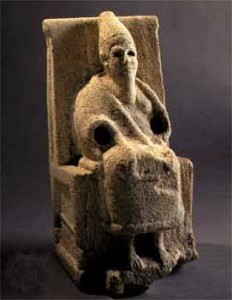 Over at the blog Religion at the Margins, there is an appealing discussion of an article from Michael Heiser, Academic Editor for Logos and friend, on whether YHWH and Elyon are distinct deities in Deuteronomy 32 and Psalm 82. The post is by Thom Stark, cleverly titled “The Most Heiser: Yahweh and Elyon in Psalm 82 and Deuteronomy 32” and you can find it here. You may want to read Heiser’s article first (you can download it here: Heiser on Deut 32 & Ps 82). The main contention is over the differing exegesis of the passages in question. For Deuteronomy 32:8-9 the question is whether עליוו (Most High) and יהוה (YHWH) are distinct deities alluding to a similar view of a divine council to that of the Canaanite pantheon of El. A similar quandary remains in Psalm 82 between the use of אלהים (god, God, or YHWH) and the use of עדת-אל (the council/assembly of El, the divine council, or YHWH’s own council) and their original meaning. Heiser maintains that in the Deuteronomy text Elyon and YHWH are the same deity and that in Psalm 82 the adat-el is YHWH’s own council. I have been dialoguing with Stark regarding his critique of Heiser and have had some good responses (you can read them here). I have some disagreements with Starks critique but overall it is a very thorough and engaging read that would be very helpful for those new to the question of the existence of a divine council in the Hebrew scriptures and the contours of the ancient Israelites’ brand of theism. For those more well versed in Hebrew and ANE backgrounds, this will provide a stimulating conversation and further reflection on these intriguing texts. Enjoy.
Over at the blog Religion at the Margins, there is an appealing discussion of an article from Michael Heiser, Academic Editor for Logos and friend, on whether YHWH and Elyon are distinct deities in Deuteronomy 32 and Psalm 82. The post is by Thom Stark, cleverly titled “The Most Heiser: Yahweh and Elyon in Psalm 82 and Deuteronomy 32” and you can find it here. You may want to read Heiser’s article first (you can download it here: Heiser on Deut 32 & Ps 82). The main contention is over the differing exegesis of the passages in question. For Deuteronomy 32:8-9 the question is whether עליוו (Most High) and יהוה (YHWH) are distinct deities alluding to a similar view of a divine council to that of the Canaanite pantheon of El. A similar quandary remains in Psalm 82 between the use of אלהים (god, God, or YHWH) and the use of עדת-אל (the council/assembly of El, the divine council, or YHWH’s own council) and their original meaning. Heiser maintains that in the Deuteronomy text Elyon and YHWH are the same deity and that in Psalm 82 the adat-el is YHWH’s own council. I have been dialoguing with Stark regarding his critique of Heiser and have had some good responses (you can read them here). I have some disagreements with Starks critique but overall it is a very thorough and engaging read that would be very helpful for those new to the question of the existence of a divine council in the Hebrew scriptures and the contours of the ancient Israelites’ brand of theism. For those more well versed in Hebrew and ANE backgrounds, this will provide a stimulating conversation and further reflection on these intriguing texts. Enjoy.
–
On a further note, Heiser was asked on his blog (in the bottom of the comment area of the post here) if he had seen the critique of his exegesis of Deut 32 and Ps 82. You will see his response there immediately after the question. After Stark saw the response Heiser gave, he in turn wrote a whole other post responding to Heiser’s disinterest back at Religion in the Margins which can be found here.




Too invested in winning? “Highly probable”? I’m not sure where that comes from, nor do I find it to be at all within the spirit of charity we’ve established in our dialogue heretofore. Why would I be invested in winning, rather than in, say, invested in figuring out what’s true?
Heiser is free to respond or not to my criticisms. I take no offense at his disinterest. I simply find his easy insinuations that something other than a desire to understand the texts is driving my (and other scholars’) exegesis to be uncharitable and intellectually dishonest.
Sorry Thom, I went ahead and deleted that last statement. I think our dialogue has been charitable thus far and would like it to remain that way. It just appeared to me that the counter response on your blog was a bit salted with snark. I truly enjoy the snarky banter such as the constant referral to “Stark and others” repeating the address Heiser uses in his comment (I say comment because it wasn’t a formal response at all, more a statement of disinterest). I just hope this is all about the evidence of the text and also being charitable with it, on both sides. I want to maintain our dialogue; I find it engaging and would like to continue dialogue on topics related to this one the future. Blessings.
Thanks, David.
Yes, well, the problem is his comment did not just express his disinterest. He attempted to make arguments and claims, as well as interjections about how the consensus is “fundamentalist” and motivating by something other than pure exegetical interest, and those are the claims I responded to. If he had just stated disinterest, and left it at that, I would not have responded. But he wanted to do both, so I responded to what he offered. His remarks were, of course, off base.
All the best!